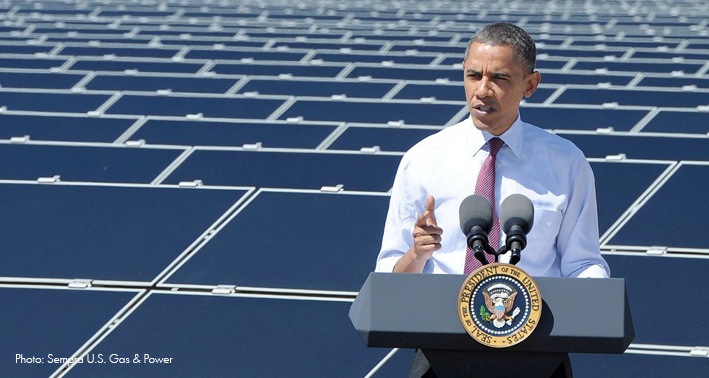The Congressional Review Act (CRA) is a legislative Loch Ness monster, much discussed and rarely seen. Members of Congress will use the CRA to seek to override the Obama Administration’s “Clean Power Plan.”
Members of Congress will seek to override the Obama Administration’s “Clean Power Plan” with a rarely-used legislative tool the Congressional Review Act.

The Congressional Review Act (CRA) is a legislative Loch Ness monster, much discussed and rarely seen (though the same could be said for motions to “Vacate the Chair” and Discharge Petitions, both of which were introduced in this Congress.) The CRA gives Congress sixty “session days” to overturn a rule issued by the Executive branch. Read more from the Congressional Research Service.
While forty-seven CRA resolutions have been introduced since 1996, only two have passed both houses and only one rule has been disapproved by Congress — the Department of Labor rule on ergonomics. It’s pretty tough for a CRA resolution to succeed in its attempt to invalidate an administrative rule, because it is usually subject to a veto by the very executive whose administration issued the rule in the first place (i.e. the President.) The special circumstance in the successful case was that incoming President George W. Bush opposed the rule and signed the CRA resolution that was waiting for him upon his inauguration.
In October, we saw the beginning of a fresh CRA attempt. On Monday, October 26, President Obama’s Clean Power Plan was published in the Federal Register, setting off the sixty-day opportunity for a CRA challenge.
So far, four resolutions have been filed challenging the Clean Power Plan rule — in the House by Rep. Ed Whitfield [R, KY] and in the Senate by Majority Leader Mitch McConnell [R, KY] and Sen. Shelly Moore Capito [R, WV]. (See House Energy and Commerce press release)
Tell Congress what you think about the resolutions to disapprove the Clean Power Plan for existing and new power plants:
 PROVIDING FOR CONGRESSIONAL DISAPPROVAL UNDER CHAPTER 8 OF TITLE 5, UNITED STATES CODE, OF A RULE SUBMITTED BY THE ENVIRONMENTAL PROTECTION AGENCY RELATING TO “STANDARDS OF PERFORMANCE FOR GREENHOUSE GAS EMISSIONS FROM NEW, MODIFIED, AND RECONSTRUCTED STATIONARY SOURCES: ELECTRIC UTILITY GENERATING UNITS (HJRes 71)
PROVIDING FOR CONGRESSIONAL DISAPPROVAL UNDER CHAPTER 8 OF TITLE 5, UNITED STATES CODE, OF A RULE SUBMITTED BY THE ENVIRONMENTAL PROTECTION AGENCY RELATING TO “STANDARDS OF PERFORMANCE FOR GREENHOUSE GAS EMISSIONS FROM NEW, MODIFIED, AND RECONSTRUCTED STATIONARY SOURCES: ELECTRIC UTILITY GENERATING UNITS (HJRes 71)
Sponsor: Rep. Ed Whitfield [R, KY]
 PROVIDING FOR CONGRESSIONAL DISAPPROVAL UNDER CHAPTER 8 OF TITLE 5, UNITED STATES CODE, OF A RULE SUBMITTED BY THE ENVIRONMENTAL PROTECTION AGENCY RELATING TO “STANDARDS OF PERFORMANCE FOR GREENHOUSE GAS EMISSIONS FROM NEW, MODIFIED, AND RECONSTRUCTED STATIONARY SOURCES: ELECTRIC UTILITY GENERATING UNITS (HJRes 71)
PROVIDING FOR CONGRESSIONAL DISAPPROVAL UNDER CHAPTER 8 OF TITLE 5, UNITED STATES CODE, OF A RULE SUBMITTED BY THE ENVIRONMENTAL PROTECTION AGENCY RELATING TO “STANDARDS OF PERFORMANCE FOR GREENHOUSE GAS EMISSIONS FROM NEW, MODIFIED, AND RECONSTRUCTED STATIONARY SOURCES: ELECTRIC UTILITY GENERATING UNITS (HJRes 71)
Sponsor: Rep. Ed Whitfield [R, KY]
 A JOINT RESOLUTION PROVIDING FOR CONGRESSIONAL DISAPPROVAL UNDER CHAPTER 8 OF TITLE 5, UNITED STATES CODE, OF A RULE SUBMITTED BY THE ENVIRONMENTAL PROTECTION AGENCY RELATING TO “STANDARDS OF PERFORMANCE FOR GREENHOUSE GAS EMISSIONS FROM NEW, MODIFIED, AND RECONSTRUCTED STATIONARY SOURCES: ELECTRIC UTILITY GENERATING UNITS (S.J.RES. 23) Sponsor: Sen. Mitch McConnell [R, KY]
A JOINT RESOLUTION PROVIDING FOR CONGRESSIONAL DISAPPROVAL UNDER CHAPTER 8 OF TITLE 5, UNITED STATES CODE, OF A RULE SUBMITTED BY THE ENVIRONMENTAL PROTECTION AGENCY RELATING TO “STANDARDS OF PERFORMANCE FOR GREENHOUSE GAS EMISSIONS FROM NEW, MODIFIED, AND RECONSTRUCTED STATIONARY SOURCES: ELECTRIC UTILITY GENERATING UNITS (S.J.RES. 23) Sponsor: Sen. Mitch McConnell [R, KY]
 A JOINT RESOLUTION PROVIDING FOR CONGRESSIONAL DISAPPROVAL UNDER CHAPTER 8 OF TITLE 5, UNITED STATES CODE, OF A RULE SUBMITTED BY THE ENVIRONMENTAL PROTECTION AGENCY RELATING TO “CARBON POLLUTION EMISSION GUIDELINES FOR EXISTING STATIONARY SOURCES: ELECTRIC UTILITY GENERATING UNITS” (S.J.RES. 24) Sponsor: Sen. Shelly Moore Capito [R, WV]
A JOINT RESOLUTION PROVIDING FOR CONGRESSIONAL DISAPPROVAL UNDER CHAPTER 8 OF TITLE 5, UNITED STATES CODE, OF A RULE SUBMITTED BY THE ENVIRONMENTAL PROTECTION AGENCY RELATING TO “CARBON POLLUTION EMISSION GUIDELINES FOR EXISTING STATIONARY SOURCES: ELECTRIC UTILITY GENERATING UNITS” (S.J.RES. 24) Sponsor: Sen. Shelly Moore Capito [R, WV]
Nearly half the Senate signed on to support the resolutions in that chamber, while at least one Republican, Sen. Kelly Ayotte [R, ME], indicated support for the Climate Plan. In order for any CRA resolution to succeed, it would need to pass both houses of Congress and garner enough votes to override a Presidential veto.



The listing of the rule also opened the door for legal challenges. According to Bloomberg BNA, the following have been filed:
- A coalition of 24 states, led by West Virginia
- Murray Energy Corp
- A coalition of 16 industry groups, including the U.S. Chamber of Commerce, National Association of Manufacturers and American Chemistry Council
- Separate lawsuits from Oklahoma and North Dakota
The timing of the rule’s release — and the ensuing controversy — is related to the upcoming Paris Climate Change Summit in December, the Washington Post reported:
Obama’s Clean Power Plan, which puts the country on course to reduce carbon dioxide emissions from power plants 32 percent below 2005 levels by 2030, is key for the United States to meet the greenhouse gas emission reduction target it pledged to the United Nations.
Opponents of the effort may seek to hold the CRA vote before the Paris Summit to fall within the 60-day review period and to raise doubts that the US can meet its climate targets under the agreement, according to the Post.
Please keep in mind that highlighting a bill does not imply POPVOX endorsement in any way. As always, our goal is to offer one more way to help you stay informed about the complex U.S. legislative system.